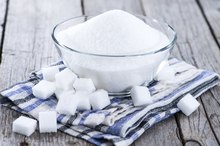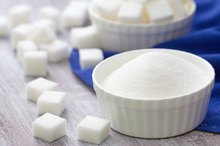Negative Effects of High-Fructose Corn Syrup
In recent years, high-fructose corn syrup has come under a lot of scrutiny. The syrup, which is found in processed foods such as cookies, granola bars, salad dressings, sauces and soft drinks, is a man-made sweetener that's nearly identical to sucrose, also known as table sugar. Chemically, high-fructose corn syrup is 50 to 55 percent fructose, which is a sugar naturally found in fruits. Arguments have been made that HFCS acts in the same way as table sugar acts in the body, but other arguments state that HFCS acts differently from table sugar, and leads to several negative effects.
May Contribute to Obesity
Excessive consumption of sugar in any form will lead to weight gain and obesity. High-fructose corn syrup may put you at increased risk for obesity, according to author Mark Hyman, a medical doctor and Jillian Michaels, a fitness trainer. A study published in 2004 in “The American Journal of Clinical Nutrition” found that over consuming sweetened beverages that contain HFCS could be related to the obesity epidemic. The study authors stated that fructose fails to stimulate insulin secretion or leptin production, both of which help regulate body weight and food consumption. Thus, fructose in the diet can lead to excess energy intake and weight gain.
Many Samples Contain Mercury
Side Effects of Using Agave Syrup
Learn More
High-fructose corn syrup contains added chemicals and toxins that are damaging to the body, according to Hyman. In a study published in 2009 in “Environmental Health,” researchers detected mercury, a toxic substance, in nine out of 20 commercial HFCS samples. Although the amount of mercury varied among different products and samples, heavy metal accumulation from overconsumption of mercury-containing HFCS foods can lead to adverse health effects. Short-term effects include chest pain, nausea, eye irritation, headaches and vision problems; long-term effects include anxiety, loss of appetite, fatigue and forgetfulness.
Doesn't Satisfy
HFCS leaves you feeling hungry shortly after eating, causing you to seek out and eat more food to satisfy your hunger. Excess food intake above what you burn off will lead to weight gain. Pure fructose doesn't activate the same fullness signals that glucose tends to activate, according to Kathleen Melanson in "What's So Bad About High Fructose Corn Syrup?" in "Eating Well." Because HFCS isn't purely fructose, however, it appears to activate appetite-regulating hormones in a manner that’s similar to that of table sugar. Although little evidence exists that HFCS affects appetite more than other sugars do, the fact that it does affect appetite warrants limited consumption and further research.
Added Sugars Are Bad, Anyway
The Side Effects of Sucrose
Learn More
In any form, sugar can lead to negative health conditions such as obesity, diabetes, heart disease and irritable bowel syndrome. Eating high doses of sugar in any form is problematic, states Peter Beyer in "What's So Bad About High Fructose Corn Syrup?" in "Eating Well." Stick to a healthy diet and enjoy sugary foods in moderation, limit your consumption of processed foods and foods that have added sugars.
Related Articles
References
- Dr. Mark Hyman: 5 Reasons High-Fructose Corn Syrup Will Kill You
- Jillian Michaels: MYTH: High-Fructose Corn Syrup Is No Worse For You Than Table Sugar
- Eating Well: Is High-Fructose Corn Syrup Bad For You?
- The American Journal of Clinical Nutrition: Consumption of High-Fructose Corn Syrup in Beverages May Play a Role in the Epidemic of Obesity; George A Bray et al; 2004
- Princeton University: A Sweet Problem: Princeton Researchers Find That High-Fructose Corn Syrup Prompts Considerably More Weight Gain
- The Washington Post: Study Finds High-Fructose Corn Syrup Contains Mercury
- Huffington Post: Why You Should Never Eat High-Fructose Corn Syrup
- Environmental Health: Mercury From Chlor-Alkali Plants: Measured Concentrations in Food Product Sugar
Writer Bio
Jennifer Andrews specializes in writing about health, wellness and nutrition. Andrews has a Master of Science in physical therapy from the University of Alberta as well as a bachelor's degree in kinesiology. She teaches yoga and pilates and is a recent graduate of the Institute of Integrative Nutrition.









